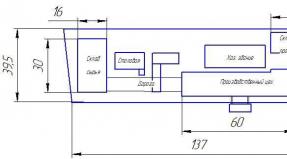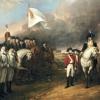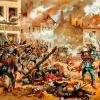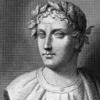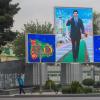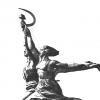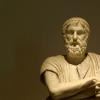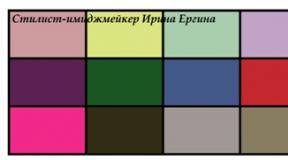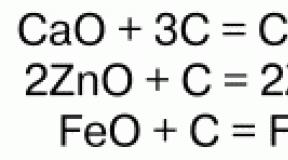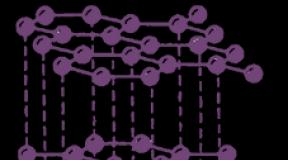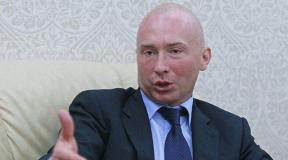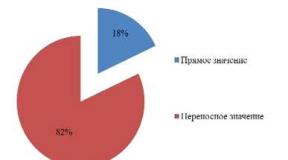Presentation history of France 20th century. The first slide of the presentation: France in the second half of the 20th century. Checking homework
Until September 1944, almost the entire territory of France was liberated from German occupation by Franco-Anglo-American troops and internal resistance forces. An important role in the anti-fascist struggle was played by the French Committee of National Liberation, which on August 30, 1944 was transformed into the Provisional Government of the French Republic, headed by General Charles de Gaulle. The interim government began the restoration of state sovereignty and the country's economy in the extremely difficult conditions of post-war devastation. The volume of industrial production was reduced to 38%, agricultural - to 60% of the pre-war level. The de Gaulle government carried out the nationalization of the coal, gas, electrical industries, and a number of large banks; v social sphere implemented measures to protect the poor, increase wages and pensions. In October 1945, elections were held for the Constituent Assembly, which were supposed to draw up a new constitution. The largest number of seats in the Constituent Assembly were received by representatives of the French Communist Party (PCF), the Socialist Party (SFIO) and the Catholic Party Republican People's Movement (MPR). In the coalition government (the communists had five ministerial portfolios) there was a sharp struggle regarding the state structure of the country. De Gaulle, unable to find a common language with the communist-socialist majority, resigned at the beginning of 1946. In December 1946, a new French Constitution was adopted - the 12-year history of the Fourth Republic began. The constitution established the universal right to work, rest, social security and education. France was declared a parliamentary republic. The main role in political life was to be played by the bicameral parliament, which also elected the president, who had limited rights.
All governments of the Fourth Republic were coalition and weak: in 12 years - 14 governments. In the spring of 1947, communist ministers were withdrawn from the government, who violated government solidarity. Once outside the government, the communists set out to destabilize the situation in the country and seize power. The Socialist Party broke off the alliance with the communists and switched to cooperation with the MRP and the radicals. A new government coalition emerged, known as the "third force" (it operated until 1951). In the first half of the 1950s, the role of the Rally of the French People (RPF), created on the initiative of de Gaulle, increased in the political struggle. At that time, center-right governments were being formed in France, where the socialists were not included.
From the end of the 1940s, an economic recovery began in France. 1948 the volume of industrial production exceeded the pre-war level; In 1956, the volume of industrial output was 2 times higher than the pre-war level. In the mid-1950s, the modern industries of France (fuel and energy, metallurgical, machine-building, chemical, radio electronics) were embraced by a scientific and technological revolution.
In foreign policy, France relied on the integration of Western European countries and the preservation of the colonial empire. 1948 France acted with Great Britain, Belgium, the Netherlands and Luxembourg as a sponsor in the creation of the Western Union for cooperation in the economic, social and military-political spheres. In the same year, France joined the Marshall Plan, according to which it received assistance in the amount of more than $ 3 billion. In 1949, the state joined the North Atlantic Pact (NATO). 1951 France signed with the FRG, Germany,
Belgium. Luxembourg and Holland, an agreement on the European Coal and Steel Community, which was the beginning of the creation of the Common Market (1957).
To preserve the colonial possessions, France waged a bloody unsuccessful war in Indochina (1946-1954). France was forced to grant independence in 1954 to Laos and Cambodia, and in 1956 to Morocco and Tunisia. However, the most brutal was the French war against the national liberation movement in Algeria (1956-1962). More than 1 million French people lived here, who owned the most fertile lands of the Mediterranean coast of Algeria. In Algeria, a reactionary alliance was formed between the army elite and the colonialists, who, in order to preserve the colony, were ready to extend the military conflict to the territory of France; A coup d'état in Paris was being prepared here. In May 1958, these forces organized a rebellion in Algiers and created the Committee of National Salvation. They demanded the establishment of strong power in France and the intensification of the struggle against the Algerian liberation movement. The country entered a political crisis. On June 1, 1958, the National Assembly approved General de Gaulle as head of government, who received emergency powers. The National Assembly was dissolved, and the Fourth Republic ceased to exist.
In September 1958, in a referendum, the French approved the new Constitution developed by de Gaulle. The constitution provided for a change in the form of government. France became a presidential republic. The president, who was elected for 7 years by general election, had the powers of head of state, chief executive and commander in chief of the armed forces; he appointed the prime minister and persons to the highest state and military positions. The president approved the laws that were passed by parliament, but could issue his own decrees without parliamentary approval. He could dissolve parliament and call new elections. November 1958. parliamentary elections were held, in which the Union for the Defense of the New Republic, created by supporters of de Gaulle, won. In December of that year, de Gaulle was elected the first president of the Fifth Republic.
In domestic policy, the government has taken a course towards stabilizing the financial system and increasing the competitiveness of industry and Agriculture. In the 1960s, the modernization of the French economy intensified. During the first 10 years of the existence of the Fifth Republic, from 1958 to 1968, industrial production increased by 60%. France has become a modern industrial power with an advanced diversified industry, including nuclear and aerospace. 1960 France tests its own nuclear weapons for the first time.
The war in Algeria remained the most acute problem in the foreign policy of the Fifth Republic. In 1959, de Gaulle recognized the right of the Algerian people to self-determination (in 1960, he granted independence to almost all African colonies). In Algiers, French officers mutinied and carried out terrorist attacks inside France. The rebellion was crushed and in 1962 Algeria became independent. The de Gaulle government pursued a more independent policy from the US in NATO: 1964 recognized communist China; 1966 withdrew from the NATO military organization, liquidated NATO military bases in France; in 1969 recognizes the border along the Odra - Neisse; opposed to American aggression in Vietnam.
at the end of the 60s, a crisis appeared in the development of the Fifth Republic. French business considered the strict regulation of the state burdensome. Trade unions tried to get rid of the state's excessive guardianship over labor relations. The broad masses were dissatisfied with the social and economic policy of the government. The most acute manifestation of such discontent was the mass demonstrations of students in Paris in May 1968. At the same time, a general strike took place, in which 10 million workers took part. The power and authority of de Gaulle were significantly shaken. In April 1969, at a referendum on administrative reform, de Gaulle's proposals were not supported, and he resigned. In the elections that took place in June, Georges Pompidou (1969-1974), a representative of the Gol-Nazi party, was elected as the new president. Government of the same. Pompe-dou, taking into account the mood of the masses, weakened the state regulation of the economy, expanded social legislation. Improved relations with the US. After the death of Pompidou, Valéry Zhiskar Esten (1974-1981) was elected president, who continued the political course of his predecessor.
In 1981, in the context of an acute economic crisis, a bloc of left-wing parties came to power in France. François Mitterrand, a socialist, became president. The left-wing government tried to get out of the crisis not by limiting government intervention, as in the UK and the US, but by spreading it further. A number of large banks and some industrial enterprises were nationalized, social programs were expanded, laws on the rights of workers and trade unions were adopted. All this led to increased inflation, depreciation of the franc. And the introduction of state control over prices and salary caused widespread discontent. In the 1986 parliamentary elections, the left was defeated. Mitterrand was forced to appoint Jacques Chirac, leader of the Gaullist Rally for the Republic (OPR), as prime minister. For the first time in the history of the Fifth Republic, the president and the prime minister found themselves in different political blocs. Government of the same. Chirac followed the path laid by M. Thatcher, denationalizing individual industrial groups and banks, weakened state regulation of business, and reduced social spending. 1988 F. Miterand again won the presidential election. But in the 1993 parliamentary elections, right-wing parties won an absolute majority of seats. E. Balladur, a representative of the ODA, was appointed prime minister. The new government resumed the privatization begun in the late 1980s by Zhe. Chirac, and sold the bulk of the financial and industrial companies that were still in the public sector. 20 large banks, aviation and oil refineries, including such well-known ones as the Renault firm, the Lyon Credit Bank, the Rhone-Poulenc chemical concern, and the like, have passed into private hands. In the public sector, there were railways, subways, power plants, a post office, and several coal mines. Measures aimed at limiting immigration became an important component of E. Balladur's domestic policy. Gradually, the socio-economic situation in the country began to normalize, the pace of industrial production accelerated, inflation decreased, and the growth of unemployment slowed down. E. Balladur became an extremely popular politician in France. In May 1995, Jacques Chirac won the presidential election in a bitter struggle (in 2002 he was re-elected president for a second term). Seriously ill F. Mitterrand died in January 1996.
In domestic politics, President Zhe. Chirac and Prime Minister Alain Juppe proclaimed a reduction in the budget deficit, inflation and France's entry into the European Monetary Union in 1999. They embarked on a path of cutting social security and government spending, as well as raising certain taxes. All these government decisions have caused acute discontent in society. In the autumn of 1995 France was swept by a wave of strikes and mass protests against the government's economic reforms. The situation was further exacerbated by the government's decision to reorganize the national railway company (partial privatization of a number of railway lines and job cuts), whose total debt to the state amounted to 175 billion francs. The railroad workers were the first to fight for the preservation of their social rights. Soon they were supported by employees of the metropolitan metro, energy, postal workers, healthcare workers, as well as lyceum students and students, who demanded an increase in allocations for education and the creation of new jobs. Under pressure from the public, the Juppe government was forced to suspend the reforms and enter into negotiations with the trade unions to correct them.
The echo of the strikes of 1995 affected the extraordinary elections to the national assembly in May - June 1997 - the right lost. In parliament, the leftists (socialists, communists, etc.), having united their efforts, were able to form a government majority. In the same situation. Chirac, just as F. Mitterrand did in his time, applied the tactic of "coexistence" and appointed the socialist Lionel Jospin as prime minister. In the government, the socialists occupied 18 of the 27 ministerial positions. The Communists, after 13 years of opposition, also entered the government; 8 ministerial posts were occupied by women. L. Jospin proposed to the French the "Republican Pact of Development and Solidarity", which provided for securing the equality of men and women, softening immigration laws, guaranteeing the independence of the judiciary, and ensuring freedom of information. Using the methods of state regulation, the government of L. Jospin managed to reduce the state budget deficit and reduce taxes, which contributed to the growth of industrial production from 1.7% in 1996 to 6.7% in 1997. The pace accelerated economic development, the GDP growth rate was 3%, inflation did not exceed 1%, the state budget deficit was brought up to 3% of GDP. The success of economic policy has enabled the government and local authorities to increase the number of jobs in the public sector, which employs 24% of the working population, to reduce unemployment. The country began a gradual transition to a 35-year working week, which ended in 2000. In 1997, the government abolished compulsory military service and raised the minimum wage. In September 2000, a referendum was held in France to reduce the presidential term from 7 to 5 years. 73% of its participants were in favor of a five-year term. For many decades, the "Corsican question" remained topical for the French leadership. In January 2002, the President of France approved a law on the status of Corsica, which he provided until 2004. additional powers in the sphere of economy, social policy and culture. Corsica remained an integral part of France.
In April - May 2002 presidential elections were held. The sensation of these elections was that in the first round in second place after Zhe. Chirac left the leader of the extreme right party National Front J.-L. Le Pen. In the second round of the presidential elections, the socialists called for voting for Zhe. Chirac, who received 82.2% of the vote, and Le Pen - 17.8%. Chirac became president of France for the second time, however, now for a 5-year term. During the parliamentary elections in June 2002, the right-wing coalition "Union for the Presidential Majority" won 355 seats out of 577. The Socialists won 140 seats. The new government was headed by a representative of the coalition party "Liberal Democracy" Pierre Raffarin. In the 21st century France entered as a highly developed industrial power, ranked 4th in the list of the richest countries in the world, a full-fledged subject of the European and world community, the focus of many democratic traditions. But before the presidential and parliamentary elections in 2007, France came up with a number of unresolved economic problems. On the one hand, planned, centralized, overly regulated, with a high degree social security and an excessive public sector economy for many years provided the French with a decent level of material well-being. On the other hand, France in terms of GDP per person has shifted over the past 25 years from 7th place in the world to 17th. Even in healthcare and social security, which are a priority for every French government, the country has dropped from 8th place in the world to 16th. The most painful issues for the French economy remain chronically high unemployment (10%, and among young people and "colored" - 20%) and the level of public debt (66% of GDP), which is five times more than in 1980. A heavy burden for the French economy became the state apparatus, which is spent 54% of GDP. In the last 20 years alone, the army of civil servants has increased by 20% and reached 5 million people.
In the presidential elections in April - May 2007, the representative of the right-wing conservative forces, the Minister of the Interior, 52-year-old Nicolas Sarkozy, won the victory, who bypassed the socialist S. Royal. The French government was headed by François Fillon. The economic program of N. Sarkozy is aimed at helping and protecting the interests of the wealthy classes and strengthening their socio-economic positions to the detriment of the needy sections of the population. The program provides for a reduction in taxes on real estate and the provision of more tax incentives for large enterprises and the highest social strata of society. N. Sarkozy set a goal to increase the value added tax, increase the 35-hour working week (wages for overtime work will not be taxed), reduce unemployment benefits and cut social benefits, create a ministry of immigration and the like. Since 2008, Sarkozy's main problem has been overcoming the economic crisis.
France's foreign policy priorities were formed under the influence of events at the turn of the 1980s and 1990s in the international arena, which significantly changed the geopolitical situation in Europe and around the world. France paid the main attention to accelerating the process of Western European integration. In 1990, in Schengen (Luxembourg), France, together with other participants in the Common Market, signed an agreement on the free movement of persons, goods and services, which entered into force in 1995. At a meeting of representatives of the heads of state and government of 12 member states of the European Communities in December 1991 in Maastricht (Netherlands), 2 documents were adopted: the Treaty on the European Union and the Final Act on Monetary and Financial Union. In February 1992, these acts were signed, which marked the creation of a single political, economic and monetary union of states with a population of 350 million people. Because the Maastricht Accords limited French sovereignty, they sparked a wave of protests and controversy. In September 1992, a referendum was held, in which 51% of the French who took part in it approved the Maastricht Treaty. After that, it was ratified by the National Assembly and entered into force. In October 1997, France, along with other EU countries, signed the Amsterdam Treaty, which expanded the powers of the supranational governing bodies of the EU.
President Chirac showed an inclination to secure France's foreign policy "with his own face." In September 1995, France resumed, despite international protests, nuclear weapons tests (until January 1996, 8 nuclear explosions). France seeks to play a leading role in European economic and military-political structures. From January 1996, she resumed her presence on the NATO Military Committee. At the same time, its leadership raised the question of replacing the commander of NATO's southern wing with a European before Washington. France and the United States have differences in almost all international issues: the role of both countries in NATO, the activities of the UN, the importance of the OSCE, the peace process in the Middle East, and the like.
In January 1991, French troops, as part of a military coalition led by the United States, took part in the war against Iraq, which occupied Kuwait. In the summer of 1999, France participated in the NATO operation against Yugoslavia in Kosovo. The US military campaign against Iraq began in March 2003 and was sharply criticized by France and Germany. Even N. Sarkozy, who was elected president of France in 2007, despite his great attachment to the United States, considers the war in Iraq an American mistake. During the 1990s and early 2000s, France, together with Germany, actively supported the idea of developing a common EU policy in the field of defense and security, which led to concern and a mixed reaction from the United States. France actively supports NATO's eastward expansion.
After the collapse of the USSR and the socialist camp, France stepped up its policy towards countries of Eastern Europe. On January 24, 1992, France recognized the independence of Ukraine, in April diplomatic relations were established between the two countries, and soon the Treaty of Friendship and Cooperation between France and Ukraine was signed (ratified by the National Assembly of France only in February 1996). In relations between the two countries, there is a steady trend towards an increase in the level of economic relations, the intensification of political and diplomatic dialogue.
Four successive stages can be distinguished in the development of France's relations with independent Ukraine:
1992-1996 - the initial stage of French-Ukrainian relations, the establishment of diplomatic contacts and the laying of a legal framework for cooperation;
1997-1999 - activation of the Ukrainian vector of France's foreign policy, transformation of the European integration theme into the main political object of bilateral relations; France has actively contributed to building strong cooperation and a special partnership between Ukraine and NATO. During an official visit to France by Ukrainian President L. Kuchma in January 1997, a Mixed Intergovernmental Commission for Economic Cooperation was established. The milestone event in the development of Ukrainian-French relations was the first visit of the President of France. Chirac to Ukraine in September 1998. Ukraine's announcement of a course towards integration into the European Union contributed to the intensification of relations with France. France actively contributed to the development and adoption at the EU summit in Helsinki in December 1999 of a joint EU strategy for Ukraine, in which, for French assistance, a provision was made to recognize the European aspirations of Ukraine and its European choice;
2000-2004 - decrease in the dynamics of French-Ukrainian relations, which is associated with contradictions within - and the foreign political situation in Ukraine;
Since 2005, a qualitatively new stage began in France's relations with Ukraine, which was stimulated by the events of the Orange Revolution and the election of the President of Ukraine. Yushchenko.
The coming to power in France in 2007 of President N. Sarkozy marked a significant change in France's policy towards the states of Central and Eastern Europe and, in particular, towards Ukraine. It is worth noting the new French leader's great enthusiasm for the events of the Orange Revolution during his visit to Kiev as a minister in February 2005. Moreover, his keynote speech contained the thesis about the possibility of "unifying the (European) continent up to Kiev."
1 slide

2 slide
France in the late XIX - early XX centuries. remained a country where agriculture took precedence over industry, and crafts and small enterprises took precedence over large factories. Bank capital, interest on bank deposits, small property - movable and immovable - are characteristic features of the French economy.

3 slide
At the beginning of the XX century. in the economic life of France there was some revival. In the eastern regions and in the north, a new metallurgical base was rapidly developing. From 1903 to 1913 iron ore production tripled. However, most of the ore was consumed not by French, but by German metallurgy. The former main metallurgical base of France in the central massif, in the Saone-et-Loire region, was in decline. France ranked second in the world (after the United States) in the production of cars, but French engineering was still growing very slowly, and 80% of all machine tools were imported from abroad.

4 slide
Schneider's firm owned not only the largest military factories in Europe, but also mines, steel mills and other enterprises in different parts of France. The French railways were monopolized by six railway companies.

5 slide
In 1912, on the average, there were more than two times fewer workers per enterprise in France than in Germany. More than a third of the entire French proletariat was employed in the textile industry, in the production of luxury goods and fashion; these industries were dominated by small businesses, work at home. One of the factors hindering the development of French industry was the poverty of coal resources.

6 slide
But the main reason for the relative backwardness of French industry lay in the French economy, in which usury capital played an important role. French banks exported capital on a grand scale, placing it in government and communal loans of foreign powers. The appearance of the "rentier" layer

7 slide
In terms of the export of capital, France ranked second in the world after England. France owned a huge colonial empire, second in size only to England.

8 slide
The law on the 11-hour working day, introduced at first for women and children, was extended to men in 1900, but the government's promise to switch to a 10-hour working day in a few years was not realized. Only in 1906 was the obligatory weekly rest finally established. France lagged behind a number of Western European countries also in the field of social security.

9 slide

10 slide

11 slide
The parliamentary elections of 1902 brought victory to the radicals (who then called themselves radical socialists), and the new cabinet, headed by E. Combe, decided to put the fight against clericalism at the center of political life

12 slide
In 1905 Parliament passed a law that finally separated church from state. The coalition of radicals and socialists that held out at the helm of power from 1899 to 1905 was called the Republican Bloc. It was the time of the highest prosperity of the country's economy.

13 slide
In 1906, Georges Clemenceau became prime minister and launched a broad program of social reforms, including the introduction of an 8-hour day. However, after the parliament rejected all his proposals, Clemenceau split the radical party and subsequently surprised French society more than once with a brutal suppression of workers' uprisings and an aggressive foreign policy.
1. The consequences of the Second World War for France.
2. Fourth Republic.
3. France during the Fifth Republic.
1. Three interrelated stages determine the history of the post-war development of France. The first period (1944-1946) is a temporary regime, under which the Provisional Government was formed, a new post-war constitution was developed, economic recovery began; the second (from December 1946 to 1958) - the time of the Fourth Republic; the third - after the adoption of the new Constitution of 1958, the period of the Fifth Republic continues.
The post-war situation of France and the provisional regime. Second World War profoundly shook the entire political and economic system of France. The third republic, which had existed since 1875, was abolished; 10% of the productive forces of France were destroyed, the level of production decreased. During the war, the collapse of its colonial empire began.
By the end of the war, a new political alignment of forces had taken shape. From August 30, 1944, the Provisional Government headed by General de Gaulle, leader of the Free French movement, operated in France. The resistance movement had a great influence on the formation of the party-political system and on the nature of the new constitution. The political parties that compromised themselves with conciliatory policies and cooperation with the German occupiers were disbanded. The government included representatives of political parties that took part in the Resistance: communists, socialists, Catholics, etc.
The provisional government carried out a number of socio-economic reforms. It raised wages, pensions, benefits for large families. The leaders of the Vichy government Laval and Pétain were sentenced to death (for Pétain it was commuted to life imprisonment). The nationalization of coal mines, Renault car factories and other enterprises was one of the first major industrial events.
In the internal political life of France, the question of the state structure was acute. As a result of contradictions with the majority of the Constituent Assembly, de Gaulle resigned on January 20, 1946. The socialist F. Gouin was appointed head of the government, and from June 1946 - the head of the People's Republican Movement (MRP) J. Bidault. In September, the Constituent Assembly adopted a draft new constitution, which was approved by referendum.
2. Fourth Republic (1946-1958). Economic growth. In accordance with the constitution, France was proclaimed a parliamentary republic. The constitution recorded the democratic and social rights of workers: to work, rest, education, state assistance in case of disability, to create trade unions, to strike; equal rights for women; proportional electoral system.
The central place in the structure of state power belonged to the parliament, which consisted of two chambers - the National Assembly and the Senate (Council of the Republic). The head of state was elected for seven years by both chambers. On November 10, 1946, elections to the National Assembly were held in France.
The needs of economic recovery led to the fact that most of the investment began to be directed to industry. This made it possible to accelerate the pace of its development. In 1948 the volume of industrial production in France exceeded the pre-war level. In agriculture, this level was surpassed in 1950.
Distinctive feature Restoration of the national economy of the country was the programming of the economy, In 1947 the government approved the "plan for modernization and reconstruction." Methods of state regulation also included the provision of state loans, tax incentives, large contracts, foreign exchange, etc. to large private enterprises.
In international relations, the constitution provided for the rejection of aggressive wars and the policy of forced colonization. Together with its colonies, France formed the French Union, the population of which formally received equal rights and obligations.
In the summer of 1948, France joined the Marshall Plan and entered into a number of economic, political and military agreements with the United States. France joined NATO, supported the plans for the remilitarization of West Germany. On May 9, 1950, R. Schuman, Minister of Foreign Affairs, came up with the idea of uniting the production of coal and steel in Western Europe (the “Shuman Plan”). In April 1951, six countries (France, Germany, Italy, Belgium, Holland, Luxembourg) signed an agreement on the creation of the European Coal and Steel Community (ECSC).
In 1952, France initiated the signing of the Treaty on the European Defense Community. On the issue of its ratification, a sharp struggle unfolded in the country. The National Assembly rejected the Treaty on the European Defense Community.
However, the political instability of the governments of the Fourth Republic held back the economic growth of the country - about 15 cabinets were replaced in 12 years. In the 1950s, social conflicts escalated. Another reason for the crisis in the republic was the colonial wars waged by France in Vietnam (1946-1954) and in Algeria (since 1954).
The government of the Republican Front, headed by the socialist Guy Mollet, recognized the independence of Tunisia and Morocco in 1956, but continued the war in Algeria. In April 1958 another political crisis erupted in France. The military and ultra-colonialists mutinied. The aim of the rebels was to create a regime of military dictatorship.
After fleeting negotiations between the leadership of the republic and General de Gaulle, the issue of granting the former leader special powers to form a "government of national salvation" was brought up. On June 1, 1958, de Gaulle was approved as head of government with emergency powers. On June 2, de Gaulle dissolved the National Assembly. These events marked the end of the Fourth Republic in France.
3. Fifth Republic and the presidency of Charles de Gaulle (1958 - 1969). Acting again as the savior of the nation, de Gaulle focused on the development of a new constitution that would limit the rights of parliament and strengthen presidential power. A referendum held in September 1958 approved a new constitution that created a mixed, presidential-parliamentary regime in France.
On October 1, 1958, de Gaulle's supporters created a new political party, the Union for the Defense of the New Republic (UNR).
Elections to the National Assembly were held according to the majoritarian system in two rounds in a sharp political struggle. As a result of the elections, the de Gaulle party UNR won the majority of seats in parliament, and in December 1958 de Gaulle was elected president of the republic.
The president, elected for seven years, received broad powers in the sphere of domestic and foreign policy: he had the functions of the head of state, the supreme commander in chief. He appointed the prime minister and ministers, approved the laws passed by parliament. He could declare a state of emergency. The legislative competence of the French Parliament was limited. The President could dissolve the National Assembly, but the Assembly itself could not control the President. France established a presidential republic.
The French Union was transformed into a community. In 1960, most of the French colonies in Africa became independent and formed 14 independent states. Thanks to a flexible policy, France retained significant political and economic influence in these regions.
In March 1962, ceasefire agreements were signed in Evian, on granting independence to Algeria.
In the 60s, a deep structural restructuring of the economy and technological modernization were carried out in France. One of the effective forms was "large projects", in which foreign capital also participated. The scientific and technological revolution led to the widespread introduction of conveyor production, automation, and electronic computers. Significant development was given to new industries - the nuclear and rocket industries. The production of consumer goods (cars, refrigerators, televisions, washing machines) also grew.
Agriculture has been significantly modernized. Its structure has changed dramatically. It has evolved into a modern commercial farming industry, closely integrated with the processing industry. France has become the largest food exporter in Western Europe.
The most important actions in foreign policy were France's withdrawal from the NATO military organization, the withdrawal of American bases from the country's territory. De Gaulle condemned the American intervention in Vietnam. Relations with the USSR were improved and an important declaration was adopted to establish an atmosphere of detente between East and West. At the same time, France has created its own nuclear-missile triad.
"Red May" (1968) and de Gaulle's resignation. Despite the successes of the de Gaulle regime, the internal situation in France at the end of the 60s became increasingly tense. In the course of the parliamentary elections of 1967, leftist groups became noticeably more active, called “toshists” (from the French “gosh” - left).
In May-June 1968, the political crisis in the country resulted in sharp clashes in society. The beginning of the events was put by student speeches for the democratization of the higher education system and fundamental changes in the state and social system of the country. On May 3, the police dispersed a student rally in the courtyard of the Sorbonne University. Many students were beaten, injured and arrested. These events shook the whole country. Hundreds of thousands of Parisians took to the streets to protest against the Gaullist regime.
The workers, supporting the students, waged a struggle for urgent economic and social demands. About 10 million people took part in the general strike. Farmers called for tax cuts and protection from competitors from Common Market countries.
The result of these speeches were serious concessions from the government and entrepreneurs: wages were increased by 13-15%. The government promised to restore the 40-hour workweek without reducing wages. Workers were guaranteed the observance of trade union freedoms at enterprises, students - the improvement of the education system.
Events in France had an international response. A surge of discontent and student unrest swept through European countries and the United States.
Despite winning the elections, in order to weaken social conflicts and direct them towards compromises and social partnership, de Gaulle decided to carry out a series of reforms. On April 27, 1969, a referendum was held in the country on a bill on a new regional division of France and reform of the Senate. Instead of traditional departments, it was supposed to establish districts with representative "professional groups" and executive power headed by appointed prefects. The results of the referendum turned out to be unfavorable for de Gaulle: 52.41% of its participants answered “no”. On the same day, General de Gaulle announced his resignation from the presidency.
France in the 70s. Regrouping of party-political forces. In the elections held in June 1969, Georges Pompidou (1969-1974) was elected president. He announced the continuation of de Gaulle's course, designating it as "continuity and dialogue." At the same time, he began to search for a compromise with the right opposition. The leader of the "independent republicans" V. Giscard d'Estaing was introduced into the government.
Domestically, Pompidou proclaimed a policy of creating a "new society" in which the working people could take part in the "management of production." As his political position consolidated, Pompidou began a radical purge of the Gaullist movement. In 1971, the party was renamed the Union of Democrats in Defense of the Republic (YDR). Georges Pompidou actively nominated representatives of the young generation of Gaullists for leading positions in the party and government. The leader of this grouping was Jacques Chirac, in whom Pompidou saw his successor.
On the eve of the 1972 parliamentary elections, the restructuring of other political parties continued. Soon the party of radicals and radical socialists split into two currents. In 1971, the socialists united, the party was named the French Socialist Party (FSP), F. Mitterrand became its leader. He tried to give cooperation with the communists a lasting character. French diplomacy achieved the conclusion in 1974 of a new Atlantic Charter, which strengthened the principles of collegiality in activities with NATO. Relations with China, Egypt, Iraq were improved. As part of the new military doctrine, North Africa was declared a "sphere of vital interests."
During this period, the socio-economic strategy changes: there was a turn towards neo-liberalism and effective market relations. The aggravation of the internal party struggle in the SDR affected the elections in March 1973. The SDR lost 4 million votes. For the first time, the crisis of Gaullism was openly revealed. Sudden death President J. Pompidou in 1974 again raised the question of choosing a strategy for the country's development for subsequent years.
After a period of organizational and political restructuring, the centrist movement revived. The leader of the new generation of centrists - "independent republicans" and a number of other small parties, which received the general name "Union for French Democracy" (SFD), was Valery Giscard d'Estaing (1974-1981), which took place in April 1974 d. presidential election was elected president. J. Chirac, representative of the SDR, became prime minister.
The presidency of B. Giscard d'Estaing coincided with a period when the French economy was being drawn into a period of deep crisis following the "oil shock". Against the backdrop of a decline in business activity, in 1975 a program was adopted to revive economic life by encouraging consumption. For 1976-1980 the seventh five-year plan was developed, which provided for an increase in employment, the elimination of the budget deficit, etc.
Post-Gaulliste France. Before the presidential elections, there was a regrouping of political forces in the government and opposition camps. In 1976, J. Chirac, leader of the YuDR, resigned as prime minister. The SDR was transformed into a broad coalition "Association in Support of the Republic" (RPR). It proclaimed allegiance to Gaullism.
In 1981, the "Union for the French Democracy" nominated V. Giscard d'Estaing as a presidential candidate. ORP after acute internal struggle settled on the candidacy of J. Chirac. The government coalition was thus split. Big pre-election disagreements also appeared in the opposition parties. An extraordinary congress of the FSP in January 1981 nominated F. Mitterrand as a presidential candidate. The Communists proposed the candidacy of J. Marchais.
The 1981 presidential and parliamentary elections, after 23 years of right-wing rule, brought victory to the left. The socialist François Mitterrand (1981-1995) became the country's president, and the socialists also had the absolute majority of seats in the National Assembly. The government was formed by P. Morois. For the first time since 1947, communists entered the coalition government.
However, an alliance of leftist forces began to rule the country at a difficult time. The primary task of the new government was to bring the country out of the economic crisis. F. Mitterrand's policy was to further expand state intervention in the economy. A law was passed on the nationalization of 18 banks, two financial and five largest industrial firms. In addition, some metallurgical and military companies were placed under state control. Social programs were expanded, state control over prices and wages was introduced.
However, by the mid-1980s, a crisis in the rule of the left was revealed in France. From mid-1982, the government turned to austerity policies, which resulted in rising unemployment. Increased indirect taxes, as well as taxes on personal income, household services.
The return to power of the right forces. In the March 1986 elections to the National Assembly, the right-wing parties won a majority and formed their own government, headed by the leader of the ODA, J. Chirac. The new government immediately announced its intention to denationalize a number of state-controlled companies and enterprises.
In a short time, the new government prepared about 30 bills that provided for the provision of incentives for capital, the abolition of price controls and taxes on large fortunes, the denationalization of financial and industrial enterprises, decided to block wages, cut government spending on public needs, carried out another devaluation of the franc, etc. .P. All this caused a stormy reaction of protest. In June 1986, millions of French people held a Week of Action in defense of their demands. Rallies, demonstrations, strikes took place all over the country.
The foreign policy position of France under F. Mitterrand was strengthened. Relations with the US and NATO have intensified. Mitterrand supported the deployment of American medium-range nuclear missiles in Europe. The new military doctrine reflected the strategy of "global deterrence". With regard to the USSR, official Paris took a tough stance, demanding the withdrawal Soviet troops from Afghanistan, the abolition of martial law in Poland, the reduction of Soviet armed forces stationed in Europe. French military forces, as part of a coalition, fought in the Gulf War in 1991.
Mitterrand paid special attention to the issues of European integration. German leader G. Kohl became a reliable partner of F. Mitterrand. The initiatives of the two countries in the field of deepening economic and political integration, the resumption of close military-political cooperation outside the framework of NATO made it possible to prepare the concept of the European Union. In 1986, the Single European Act was signed. Even earlier (in 1990) Mitterrand supported the unification of Germany.
The elections to the National Assembly held in May 1993 brought triumphant success to the parties of the right, which abandoned the radicalism of the left and built their program on the slogans of "responsibility" and "confidence", moderate reforms, the fight against social inequality and unemployment, crime and terrorism .
In 1994, the Channel Tunnel was officially opened, connecting France and England.
In May 1995, the leader of the right, the mayor of Paris, Jacques Chirac, won the presidential election. F. Mitterrand due to illness could not take part in them. Chirac's new conservative government, which brought him to power on the platform of reducing France's high unemployment rate, had the support of large majorities in both houses of Parliament.
In 1997, according to the results of early elections to the National Assembly, the bloc of left forces (socialists, communists, "greens") won. So, under the right president, the left government of the socialist L. Jospin was formed. A balanced, professional and de-ideologized style of action became the hallmark of the new cabinet. This course was called “left realism”.
In all cases, the government avoided extremes and offered constructive compromise options for getting out of difficult situations. The press called this policy "modernization with a human face." The tax policy made it possible to reduce the level of the budget deficit and bring it to the requirements of the procedure for the transition to the European monetary system
In foreign policy, J. Chirac made a course correction. The moratorium on nuclear weapons testing was lifted. France returned to the policy of integration into the military structure of NATO. But in the late 1990s, France began to condemn the US desire for hegemony and returned to European projects.
In 2007, after the expiration of his term, Jacques Chirac resigned from the presidency. His party colleague N. Sarkozy was elected President. He intends to settle relations with the United States. In July 2008, he managed to convene a summit of 48 states of Europe and the Mediterranean, at which it was decided to create their union.
France in the second half of the 20th century. Consider what happened to France during World War II. Before the war, there was a Third Republic (). It was a presidential republic. In 1940, the northern part of France was occupied by the Germans, and the collaborationist regime of Marshal Pétain was formed in the southern part. The Third Republic thus fell. French leader Marshal Henri Philippe Pétain greets Adolphe Guitlar at Montoire-sur-la-Loire on October 24, 1940. On the right is Reich Foreign Minister Joachim von Ribbentrop. In 1944, France was liberated. The main leaders of the Vichy regime were tried for high treason in the years. De Gaulle in the liberated Cherbourg. Pierre Laval (), shot in 1945
France in the second half of the 20th century. Charles de Gaulle () In France there was a Provisional Government, which was headed by main character Resistance General de Gaulle. The government was coalition. It included all the parties that actively participated in the Resistance, including communists and socialists. The main question was about the nature of the future state structure. There were two main options - a presidential republic and a parliamentary republic.

France in the second half of the 20th century. Charles de Gaulle () As a result, the variant of a parliamentary multi-party republic triumphed. De Gaulle did not like it 1946 - The Constitution and the establishment of the regime of the Fourth Republic in France. De Gaulle left for a while. He was a supporter of more right-wing, authoritarian and nationalist ideas. Why do you think de Gaulle, a man of military hardening, adhered to the idea of a "presidential republic"?

France in the second half of the 20th century. Lesson plan 1. Fourth Republic () 2. Fifth Republic () De Gaulle in power (). 3. The student revolution of 1968 and the departure of de Gaulle. 4. From socialist Mitterrand to neo-Gaullist Sarkozy ()

1. Fourth Republic () The Constitution of the Fourth Republic did not provide for a strong presidential power independent of parliament. The regime of the Fourth Republic proved unstable. Governments were formed by a coalition of heterogeneous forces. From 1944 to 1958, 26 (!) cabinets were replaced. The main failure in the policy of the Fourth Republic was the colonial war in Algeria () War in Algeria ()

1. Fourth Republic () January 8, 1961, after the return of de Gore, a referendum was held on the fate of the Algerian problem. 75% of the survey participants were in favor of granting independence to Algeria. The war was extremely unpopular with the people. The war in Algiers claimed about 40 thousand lives

1. The Fourth Republic () years became the years of a deep political crisis of the IV Republic. A protracted war in Algeria, unsuccessful attempts to form a Council of Ministers, and finally an economic crisis. René Coty, the last president of the Fourth Republic Everyone was dissatisfied with the war in Algeria - both those who wanted peace and those ultra-right forces that did not want to allow the independence of Algeria. In September 1958, the French parliament approved the new government of de Gaulle. Among the French at that time there were many supporters of "strong power." Who do you think they wanted to see in power?

2. The Fifth Republic (...) De Gaulle in power () Charles de Gaulle () 1958 - the adoption of a new Constitution and the establishment of the Fifth Republic.

2. Fifth Republic (...) De Gaulle in power () Charles de Gaulle () “When the institutions of the republic, the independence of the nation, the integrity of its territory or the fulfillment of international obligations are under serious and immediate threat, and the normal functioning of the constitutional organs of state power is disrupted, the president Republic takes measures that are dictated by these circumstances. To do this, a simple consultation with the prime minister, the chairmen of both chambers of parliament and the Constitutional Council is sufficient ”(from article 16 of the 1958 Constitution) How can one characterize the power that the President receives in emergency situations under the Constitution of the Fifth Republic?

2. The Fifth Republic (...) De Gaulle in power () Charles de Gaulle () 1958 - the adoption of a new Constitution and the establishment of the Fifth Republic. De Gaulle's dream of 12 years ago came true - a republic with strong presidential power De Gaulle himself, having been elected president, became something like a "national arbiter"

2. The Fifth Republic (...) De Gaulle in power () Charles de Gaulle - man of the year (1958) Cover of Time magazine “What is the justification for Article 16? I recalled that precisely because of the absence of such an article in June 1940, President Lebrun, instead of moving with the state apparatus to Algeria, called on Marshal Pétain and thereby opened the way to capitulation ”(From de Gaulle’s memoirs) How de Gaulle justified authoritarianism presidential power in emergencies? What events in the history of France influenced these views of de Gaulle?

2. The Fifth Republic (...) De Gaulle in power () In 1965, Charles de Gaulle was elected for a second term (another 7 litas according to the Constitution). Charles de Gaulle () In 1962, De Gaulle ended the Algerian war, granting independence to Algeria. Read the second paragraph in the Fifth Republic section of the 24th paragraph. Highlight the main features of Gaullism. A party of his supporters rallied around de Gaulle (now called the Union for a Popular Movement). The ideology for her was "Gaulism"

2. The Fifth Republic (…) De Gaulle in power () "Political Spectrum": Far Left Left Right Far Right Social Democrats Communists Anarchists Conservatives Nationalists Which part of the political spectrum would you classify as worms?

3. Student revolution in 1968. What do you know about the student revolution of May 1968? Who took part in it? One of the posters in May 1968 was "Ten lyat is enough!" What were the rebellious students hinting at? Ironic May 1968 poster. Look at the poster. A shadowy figure gagging a student - who is it? Why do you think De Gaulle, with his authoritarianism, was far from the protest youth of the 1960s?


3. Student revolution in 1968. France in May 1968 was actually divided into "young" and "old". Street fights between youth and police in the Latin Quarter of Paris did not subside. On May 30, 1968, De Gaulle spoke on television. He declared that he would not leave his post, dissolved the National Assembly and called early elections. The Gaullists won the elections.

3. Student revolution in 1968. Nevertheless, in 1969, the almost 80-year-old de Gaulle resigned from power - voluntarily. De Gaulle was often accused of authoritarianism. Remember how de Gaulle stepped down from power in 1946 when the Fourth Republic was proclaimed. Can he be considered a fully authoritarian politician?

Valary Giscard d Estaing, President of France () Georges Pompidou, President of France (June 20 April 1974) After de Gaulle, his course was continued by his devoted supporter Georges Pompidou. He invested a lot of effort in the modernization of the country, but died in 1974 from a rare form of leukemia. In the 1974 elections, Valery Giscard d'Estaing defeated the socialist François Mitterrand in a hard struggle. “When Giscard looks at me, I feel: he thinks that I am dying too slowly” (Pompidou in 1974)

4. From the socialist Mitterrand to the neo-Gaullist Sarkozy () Francois Mitterrand, President of France Rejection of the policy of neoliberalism. Nationalization of large banks and corporations. Increase in pensions, the lower wage threshold.

4. From the socialist Mitterrand to the neo-Gaullist Sarkozy () Jacques Chirac, President of France (from 1995 to 2007) In 1995, the Gaullists returned to power in the person of Jacques Chirac. The current president is Nicolas Sarkozy.

4. From Socialist Mitterrand to Neo-Gaullist Sarkozy () "Political Spectrum": Far Left Left Right Far Right Social Democrats Communists Anarchists Conservatives Nationalists Which part of the political spectrum can be attributed to François Mitterrand and Jacques Chirac?
During the Second World War, France was partially occupied by Germany, and partially controlled by the government of Marshal Pétain, loyal to Germany. At the same time, both in France and abroad, there was a resistance movement, whose members fought for the liberation of the country. The leader of this movement was General Charles de Gaulle, who by the end of the war had become a national hero. After the liberation of France, he became head of the provisional government.
Events
1946- adoption of the constitution of the Fourth Republic (1946-1958). De Gaulle advocated a presidential republic with the very broad powers of the president, but in the end a constitution was adopted, according to which France became closer to a parliamentary republic in the form of government, and the power of the president was rather weak. De Gaulle resigned and joined the opposition.
1946- the beginning of the decolonization of France: its protectorates of Syria and Lebanon gained independence. Subsequently, France lost almost all of its colonies - in Indochina, Africa, etc.
1954- Anti-French uprising begins in Algiers. Algiers did not have the status of a colony, but of one of the departments of France; a large number of ethnic French lived in it. The struggle was very fierce and split French society into those who were ready to give up Algeria, and those who were ready to keep it at any cost.
1958- At the peak of the Algerian crisis, de Gaulle becomes prime minister with emergency powers. The constitution of the Fifth Republic is adopted (it is still in force), presidential powers are significantly expanded, in January 1959 de Gaulle becomes president.
1962 Algeria declared independence.
1966 France is leaving NATO. France was one of the founding countries of NATO, but de Gaulle did not like the dominance of the United States, under him France sought to pursue an independent foreign policy.
May 1968- mass demonstrations of students and workers, known as Red May. The first to speak were students, many of whom shared leftist ideas; they protested against the general atmosphere of unfreedom in the country and against de Gaulle personally, who was considered a usurper belonging to the same bygone era. Student demonstrations were dispersed by the police, but soon millions of workers dissatisfied with their position joined the students. The government succeeded in putting down the unrest, but de Gaulle's position was shaken; in 1969 he retired. After the resignation of de Gaulle and up to the present day, France is distinguished by relative political stability.
October - November 2005- riots in France. After decolonization, many inhabitants of the former colonies (primarily from Africa - both Black and Arab) immigrated to France and received French citizenship. At the same time, their level of integration into French society turned out to be quite low. This social group is characterized by compact living in disadvantaged areas and a high level of unemployment. It was in such areas that mass riots broke out in the fall of 2005, expressed in clashes with the police, arson of cars and shops, pogroms and looting. These events launched another round of discussion about the problems of social integration of migrants.
January 7, 2015- A terrorist attack by Islamists on the editorial office of the satirical magazine Charlie Hebdo, which published, among other things, cartoons of the Prophet Muhammad. 12 people were killed, making it the largest terrorist attack in French history. The actions of the terrorists have sparked millions in protests and solidarity with the victims around the world (see: Charlie Hebdo).
Conclusion
The post-war history of France, at first associated with a certain instability associated with the processes of decolonization, is subsequently characterized by fairly stable development and the absence of significant upheavals, with the exception of the events of May 1968. At the moment, the main threats and problems in France are related to the situation of immigrants from the former French colonies, as well as to Islamist terrorism.
In 1946, the year after the end of the Second World War, France established the so-called. Fourth Republic which lasted until 1958. This period in the history of France is characterized by the recovery of the economy and industry associated with the "Marshall Plan" (American financial assistance to European countries in exchange for actual dependence in foreign affairs). V 1949 France joined NATO. The same period of time is characterized by the beginning of the fall of colonial France: Syria and Lebanon gained independence. At the same time, France supported the reactionary regime in Indochina by sending its troops there. In 1951, together with Germany, Italy, Belgium, the Netherlands and Luxembourg, France joined the European Coal and Steel Community - the prototype of the European Union (EU).
Rice. 1. Charles de Gaulle ()
V 1958 a general came to power (see Fig. 1). In the same year, the Constitution was adopted in a referendum (popular vote). Fifth Republic, which greatly expanded the functions of the president. During the reign of de Gaulle, France experienced the collapse of the colonial system. In the 1960s France lost almost all of its colonies - Algeria, Tunisia, Chad, Mali, Senegal and others. In 1968, the so-called. " May events". Due to the crisis of overproduction, French youth and students found themselves in a state of mass unemployment, and living conditions worsened. Rigid administrative procedures reigned on campuses. In early May 1968, a student demonstration was brutally dispersed by the police. The students who went on strike were joined by trade unions, whose members were also in a deplorable socio-economic situation. The demonstrations were ruthlessly suppressed by the troops and the police, which further aroused the anger of the strikers and the sympathy of ordinary Frenchmen. More and more French demanded de Gaulle's resignation and social reforms. Eventually "Red May" initiated the crisis of the Fifth Republic and a year later dismissed President de Gaulle (see Fig. 2).

Rice. 2. "Red May" in Paris ()
V 1969 came to power Gaullist (supporter of de Gaulle)Georges Pompidou. Started "30th Anniversary of Prosperity". Social and economic transformations were carried out, agriculture was modernized, large investments were made in the computerization and informatization of France. In foreign policy, there has been a process of rapprochement between capitalist France and the USSR.
Pompidou's successor 1974 became Valerie Giscard d'Estaing, who continued the modernization of French industry and economy. Particular emphasis was placed on development and high-tech programs. In foreign policy, France began to gradually return to the bosom of American politics and the North Atlantic alliance - NATO. The second half of the term fell on a severe economic crisis, the result of which was the policy of "austerity", which led to the actual cessation of funding for French territories in tropical Africa and their loss soon.
V 1981 Socialist elected new President of France Francois Mitterrand(see Fig. 3). Under him, an economic upsurge began, many social programs were implemented, and a turn to another rapprochement with the USSR began.

Rice. 3. Francois Mitterrand and Mikhail Gorbachev ()
V 1995 became the new president Jacques Chirac, in which France returned to the position of Gaullism in foreign policy, i.e. distancing from the United States, while remaining in the NATO bloc. In domestic politics, Chirac adhered to liberalism and at the same time allowed himself state intervention in the market.
V 2007 was elected President of France Nicolas Sarkozy. Under him, France began to play one of the leading roles in European politics. Being the leading European power in the conditions of the economic crisis of 2008, France, along with Germany, were the outposts of the EU politics and economy. In foreign policy, Sarkozy's France was a staunch supporter of European integration. During the Georgian-Ossetian conflict in 2008, Sarkozy acted as an intermediary between the warring parties.
V 2012 Sarkozy lost the presidential election, giving way to a socialist Francois Hollande(see Fig. 4).

Rice. 4. French President Hollande ()
Bibliography
- Shubin A.V. General history. Recent history. Grade 9: textbook. For general education institutions. - M.: Moscow textbooks, 2010.
- Soroko-Tsyupa O.S., Soroko-Tsyupa A.O. General history. Recent history, 9th grade. - M.: Education, 2010.
- Sergeev E.Yu. General history. Recent history. Grade 9 - M.: Education, 2011.
Homework
- Read paragraph 19, pp. 197-200 of A.V. Shubin's textbook, and answer question 4 on p. 202.
- Why was France's foreign policy aimed at maneuvering between the USSR and the USA?
- How can you explain the events of "Red May"?
- Internet portal Coldwar.ru ().
- Internet portal Marksist.blox.u/ ().
- Expert().


